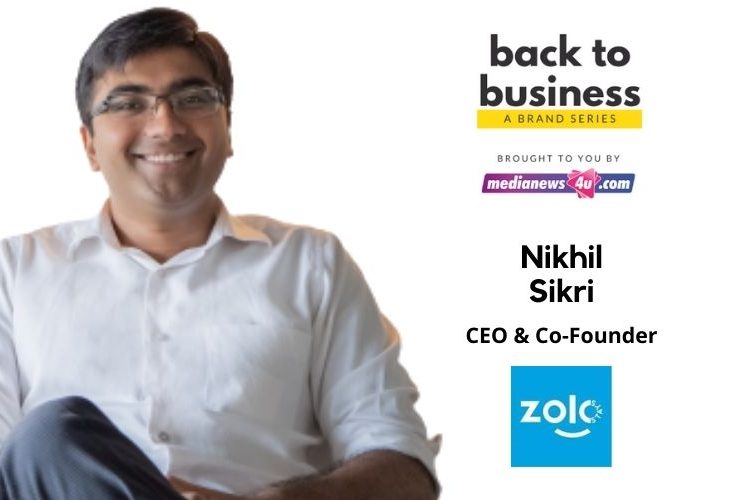The new normals in a post covid-19 world include one major shift in the way business will be conducted, and that is working from home. Multiple MNCs have already announced their work from home policy even after Covid-19 is defeated.
In a world post-lockdown, where the rules of the game are set to change, or rather have already changed, the way forward for co-working spaces in the country is certainly an unknown road.
The nation-wide lockdown is slowly being lifted across orange and green zones and life is slowly crawling back to a new-normalcy. Businesses and brands are now are making their way back into the business; planning their communication plans for a new world post the covid-19 lockdown.
Well Covid-19 is not over yet, but it’s definitely the start of good. It’s time for Back to Business…
Nikhil Sikri, CEO & Co-Founder, Zolo Stays shares his insights of how they have been dealing with the pandemic while highlighting their post-lockdown plans.
How are you coping up with the impact of Covid-19 on your brand/company/organization? How effectively have you used the lockdown period?
The new normal took some getting used to as we thrive on in person meet ups but we got over it quickly. With the average age of employees in our company being below 30, who were already digital natives the move was quicker. The culture of collaboration that already existed helped everyone make the transition faster. The teams got together to help each other make the shift and work in a more efficient manner.
We are still consistently following the ‘Work from Home’ protocol. We have used this lockdown period to strategize new and innovative ways to upgrade our offerings. We have also initiated several internship programs for college students and launched new digital campaigns, keeping in mind the need of the population during this time.
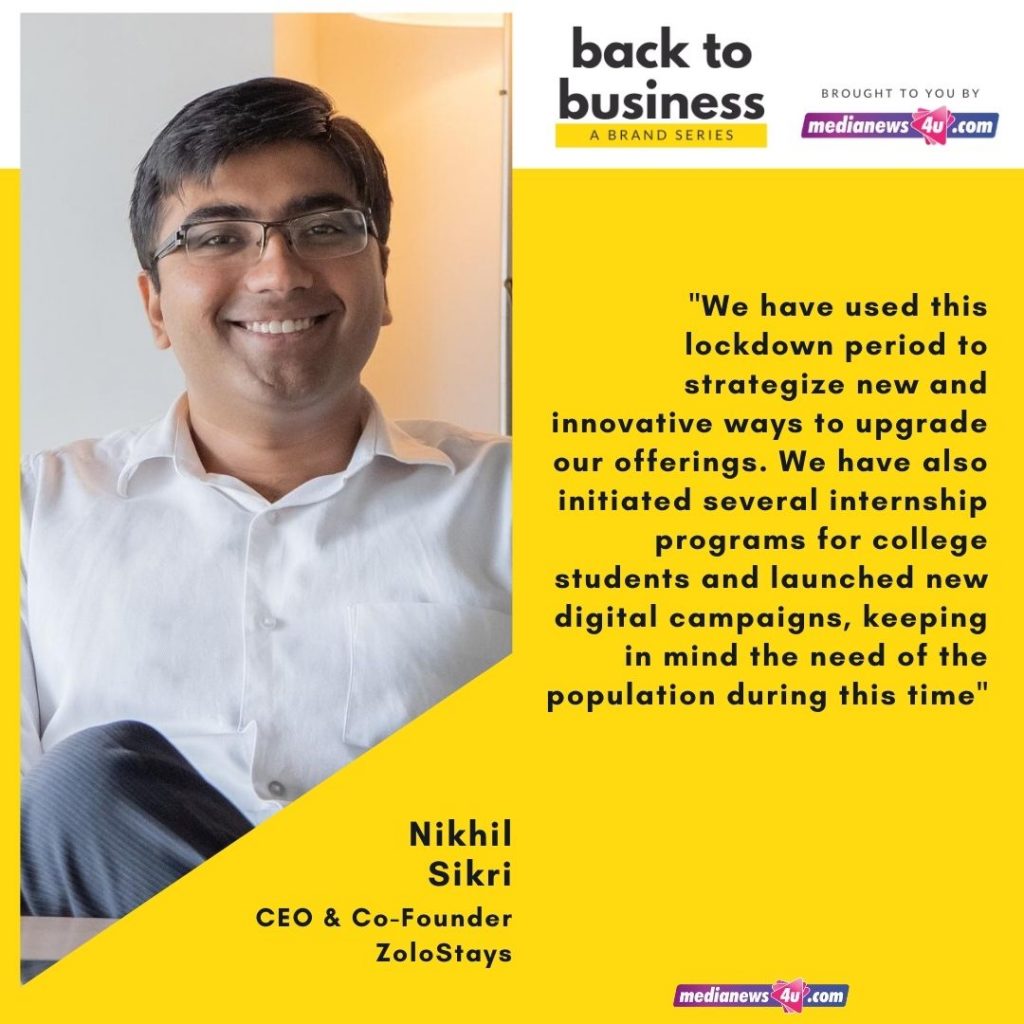
The quest for a solution to a particular crisis helps invent new business opportunities and sometimes leads to a revision of existing business models … What sort of innovation has or will the Covid-19 pandemic bring to your brand and industry??
Co-living companies have seen almost zero demand in the last 3 months due to the novel coronavirus pandemic. They are expecting occupancy to be down by 40-50% in May. Many of them have also cut down their growth projections by half. However, the lockdown has also come with a silver lining. It has forced the start-ups to go back to the drawing board and relook at the business fundamentals:
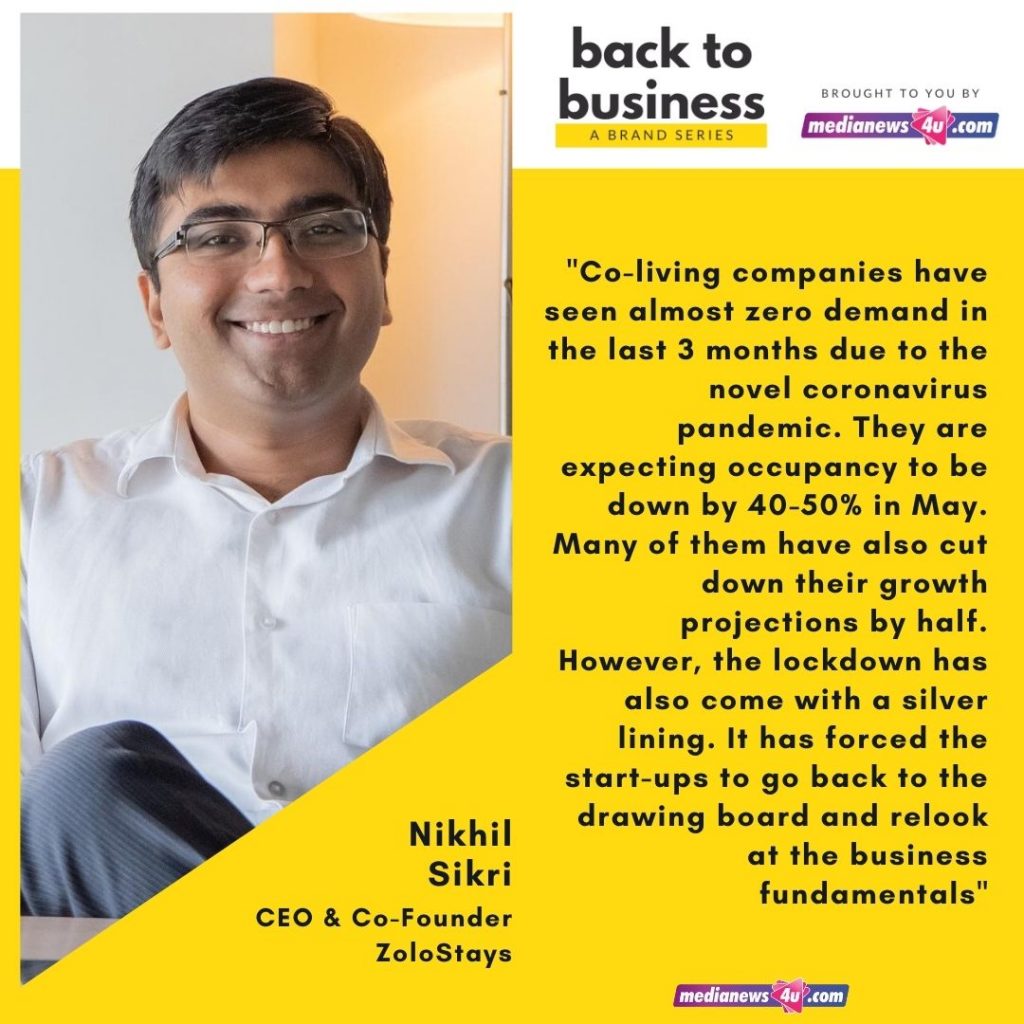
Many of the start-ups which had minimum guarantee agreements with the property owners have started negotiating with them for changing the agreements to revenue share models
Companies have started targeting corporates and educational institutions more rather than retail customers. It creates a win-win situation for co-living platforms who get bulk demand and branding opportunities for employers.
The platforms have also used the lockdown to set straight internal processes and increase internal efficiencies. Many of them are outsourcing secondary functions and creating leaner systems.
A few businesses may also consider acquisitions. Consolidation may happen with smaller players either folding up or being acquired by the well capitalised established co-living platforms.
Co-living spaces are ramping up their hygiene and sanitation standards. Increased frequency of housekeeping, sanitisers at places where people come together often, increased scrutiny on cleaning practices and PPEs are set to become the norm.
Start-ups are tying up with insurance companies, healthcare providers, and sports arenas and focusing on community experience to cultivate loyalty among their customers.
Platforms are also trying to transform their offline community activities to equivalent online avatars.
While some parts of the country have become Covid-19 free, cities like Mumbai and Delhi are still in a lockdown situation. How are you planning to resume business across cities that are not in the Red?
The safety measures and protocols implemented in our properties have been effective enough in preventing the virus from entering our premises. Hence, we will continue to follow these precautionary measures at the moment.
What will be your communication strategy post the opening of the lockdown? Understandably bringing customers back to you would be difficult… What will be the objective of the communication/marketing strategy?
As a team we were always very hands-on but with this crisis the need to communicate and reach out to all team members to keep the team working seamlessly together has been essential. Handling large teams across multiple verticals, we need to ensure that they are involved and know they are part of the team. As a team, we have been very mindful about mental wellbeing. With the lockdown this has been brought into sharp focus. We have taken up multiple sessions to help all our teams cope with the pressures of the lockdown.
The objective of our communication strategy would largely focus on the safe environment that we provide for our customers. The health and well-being of our residents has always been our focus and we want to reaffirm our commitment to the security and well-being of our residents.
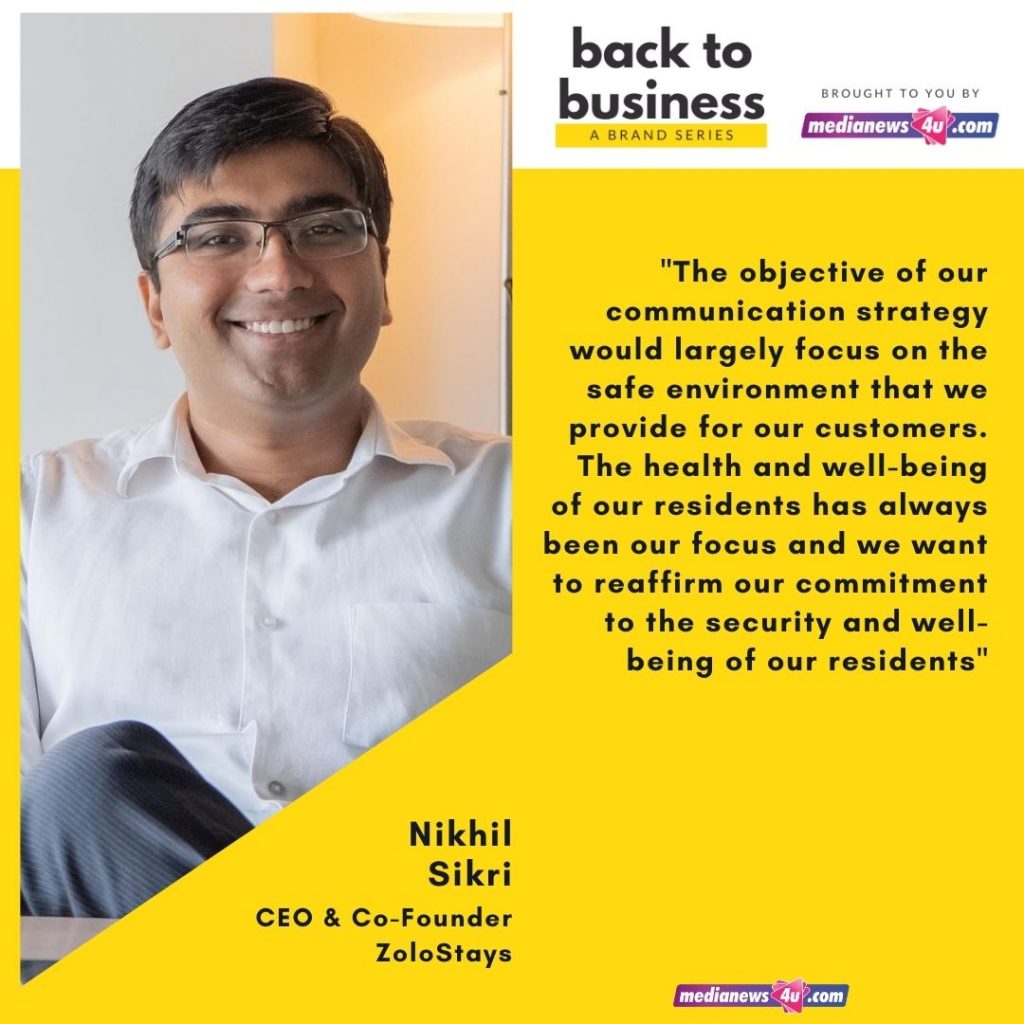
How did you keep the morale of the employees during this lockdown period? On a personal note, what kept you positive?
One of the biggest challenges that we face is addressing people challenges. This could refer to employee pushback in terms of lack of trust and a sense of belongingness to your company. We have been able to empathize with the personal and professional challenges that employees are facing, pay attention to how some of them might be struggling and take corresponding measures to support them.
Agreed, there is a lot more need to keep the team united during this time. Apart from the weekly team updates, we have also started to run casual hangout calls, like playing online games during the weekends to ensure a stronger bond amongst the employees. This has created a closer connect between individuals and have improved the creativity and productiveness of employees in achieving their targets despite the lockdown.
It is always extremely important to keep your communication open with your employees, stakeholders and residents/customers, during this time. The need of the hour is to create a sense of belongingness and unity that we are all in this together as a team.
We have managed to handle these roadblocks by constantly being in touch with the team and all our stakeholders through regular emails and phone calls every week. The responsibility as Founders of a company is a herculean task. My outlook towards any crisis is finding out a solution. This has challenged me in more ways than one to be optimistic and positive towards the future.
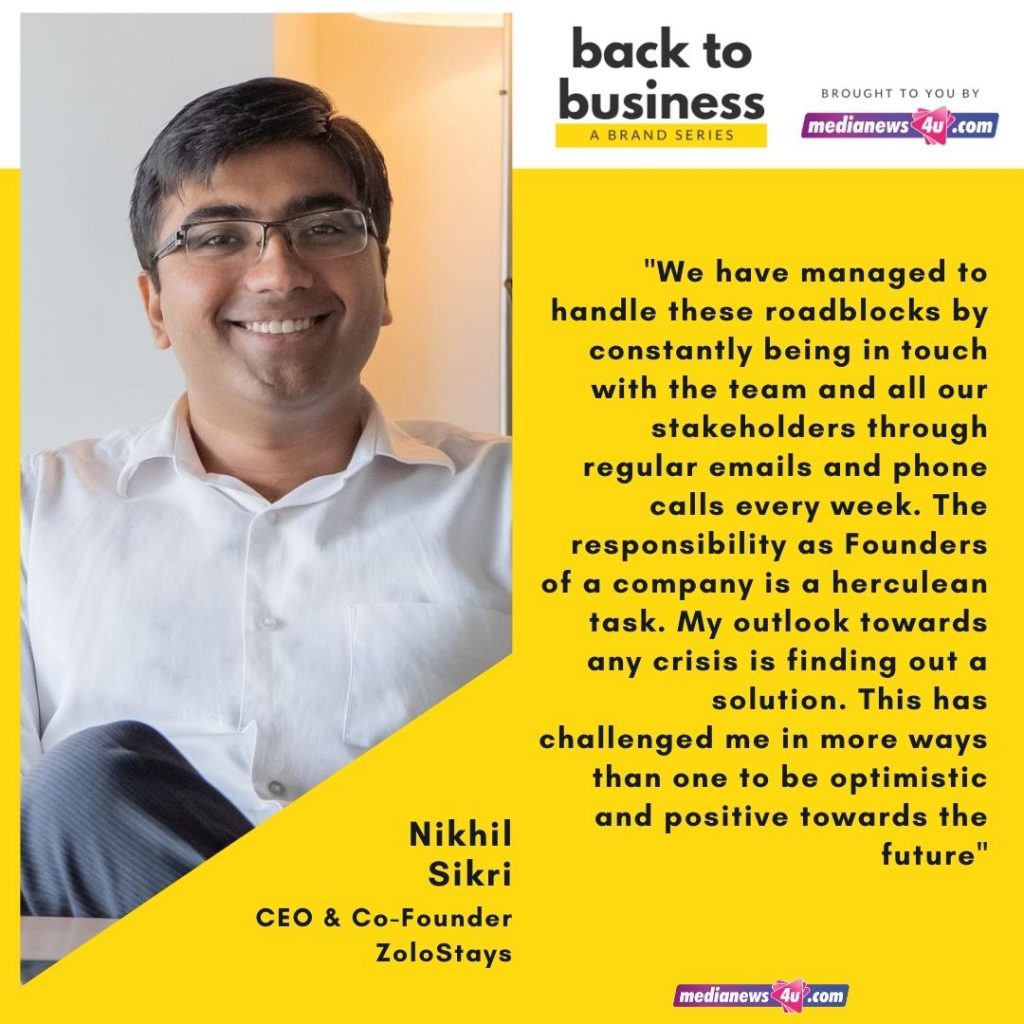
What are some of the post-lockdown business strategies that you will use to bring the business back on track or at least get it in the right direction and also create demand for yourself?
There is no doubt that COVID-19 pandemic has resulted in reduction in growth for all sectors. Our focus now is to work around the crisis in terms of developing sustainable living and sustainable working conditions for our employees.
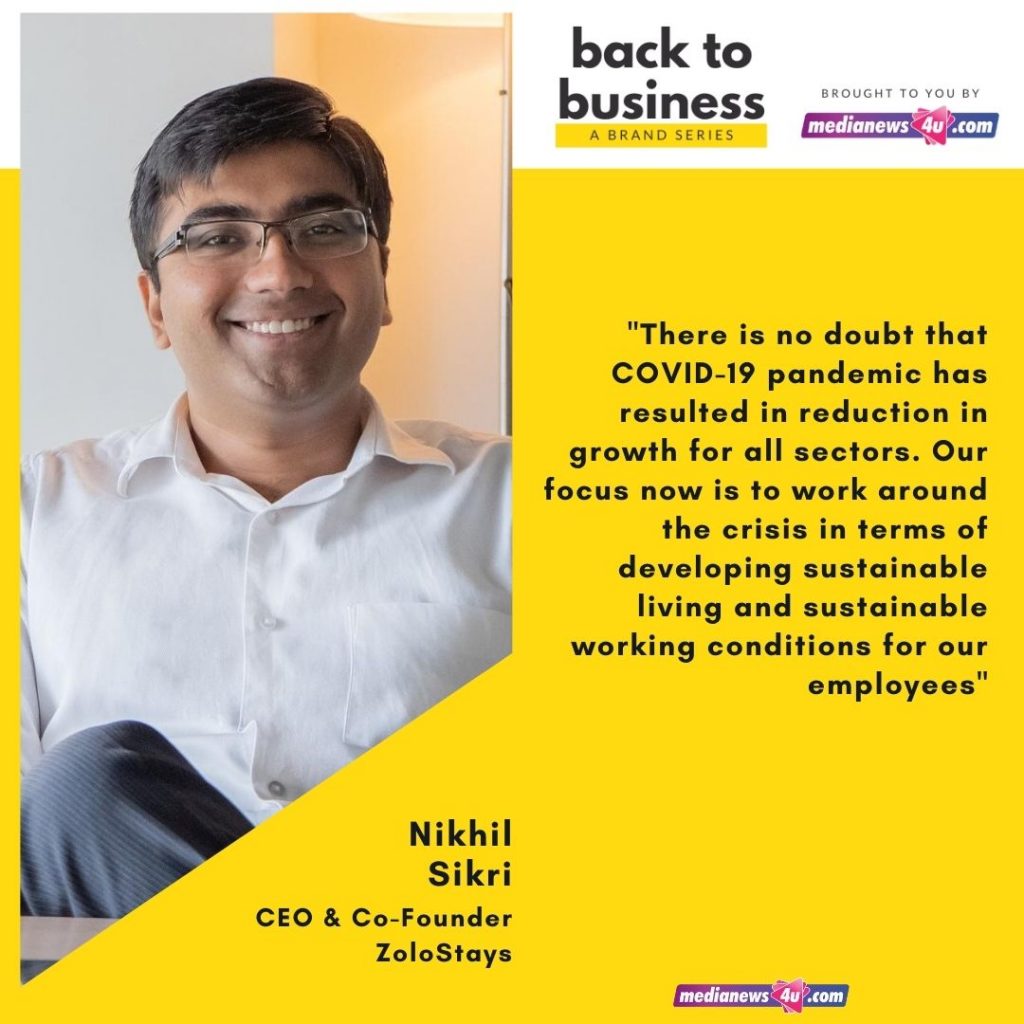
We believe that now is not the time to think about profitability but to reach out to the people who are in need of a safe accommodation and environment.
Tie-ups with corporates as a housing partner is another way that we see a sustained business model going forward.

